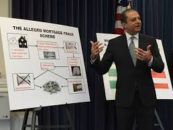Federal prosecutors are fighting to keep secret the mass of evidence in the long-running investigation into the scheme to take over and defraud homeowners associations.
Lawyers with the Justice Department’s Fraud Section in Washington filed court papers late last week opposing the Las Vegas Review-Journal’s request to dissolve two protective orders that withhold documents in the high-profile case from the public.
RELATED: Family Accused in $20 Million Mortgage Fraud Scheme
Attorney Maggie McLetchie, representing the newspaper, argued in court filings June 9 that the public has a right to see the evidence, most of which has long ago been turned over to defense lawyers. With most of the 42 convicted defendants sentenced, the epic case is essentially over.
Former construction company boss Leon Benzer orchestrated the scheme, which occurred between 2003 and 2009, to gain control of a dozen HOAs through rigged elections. The goal was to get the boards to sued contractors and then funnel multimillion-dollar contracts to do construction-defect repairs to his company.
Benzer pleaded guilty in January, avoiding a trial that would have forced the government to make public much of the evidence in the wide-ranging scheme, which included prominent attorneys, police officers and others. He is to be sentenced Aug. 6.
U.S. Magistrate Judge George Foley Jr., who signed the protective orders, has set an Aug. 5 hearing to decide whether to recommend granting the Review-Journal’s request.
Prosecutors do not oppose the release of some three-dozen sealed documents filed in the case but don’t want to make public some six million pages of documents they had turned over to defense lawyers.
McLetchie said Monday that she’s pleased the government supports unsealing the handful of documents filed with the court.
But she added, “This case raises important questions of public policy. The public wants to know what the underlying facts are, and the government shouldn’t be able to cloak every single document in the case in secrecy.”
The evidence includes, bank records, mortgage files, emails and documents seized during valley-wide FBI-led raids in September 2008, when the investigation became public. The evidence also includes, search warrant affidavits, grand jury testimony and FBI and Las Vegas reports of interviews with witnesses and defendants.
RELATED: Feds Call National Mortgage Servicer
Justice Department lawyers said that because most of the evidence was not filed with the court, the newspaper should try to get it from other sources under the federal Freedom of Information Act. Prosecutors also argued that if the evidence is made public by the court, it could subject witnesses and defendants to possible identity theft because the documents contain social security numbers, drivers license numbers, dates of birth, addresses and bank account numbers.
Disclosing evidence covered under the second protective order posses additional concerns, prosecutors said.
Prosecutors confirmed that the second order involves documents related to a Justice Department investigation into alleged leaks in the HOA investigation.
They said the Justice Department’s Public Integrity Section investigated allegations “involving, among others, personnel for the U.S. Attorney’s Office for the District of Nevada, as well as other local public figures.
“This investigation resulted in no criminal charges or disciplinary action concerning any government employee,” prosecutors wrote. “Nor were any charges brought against any non-government individuals or public figures involved in the investigation.”
Prosecutors added: “There is a very specific risk of harm and prejudice if the second protective order was dissolved and individuals who had reviewed the … file could speak to the press and others about these allegations. The individuals mentioned in the … file could face public ridicule and irreparable damage to their reputations on the basis of uncharged and unproven conduct.”
But McLetchie responded, “Protecting people from embarrassment is not a valid basis to keep information from the public, especially when we’re talking about public officials.”
On the day the first defendant pleaded guilty in the HOA investigation in August 2011, the Justice Department in Washington issued a statement saying it was unable to substantiate the leak allegations. The Fraud Section took over the HOA investigation in late 2010 after the conduct of the U.S. attorney’s office came under suspicion.
The court order allowed defense attorneys to review documents related to the leak investigation in the presence of an FBI agent, but they were not allowed to have copies.
In unrelated court papers last week, attorney Chris Rasmussen said the “draconian measures” for review made him avoid inspecting the documents because he worried about the “consequences” prosecutors warned he might face if anything from them became public.
None of the defense attorneys for defendants in the HOA case have weighed in on the Review-Journal’s effort to open the sealed files.
Now, we want to hear from you! Would like to share your opinion or make a comment on the Unlock Your Wealth Radio Show? If so, then please leave your comment or questions in the space provided below and share this article with your friends and family on Facebook and Twitter. Your comments or question could be chosen as our featured Money Question Monday and a phone call by financial expert Heather Wagenhals could dial your way to be live on the Unlock Your Wealth Radio Show.





